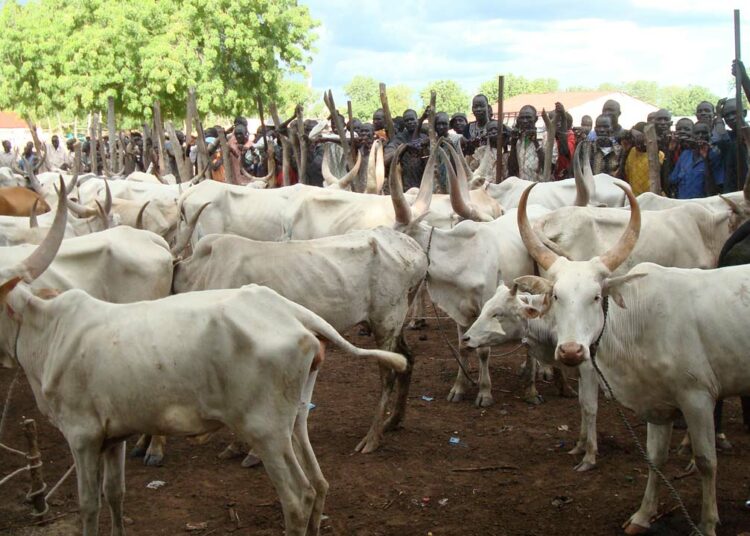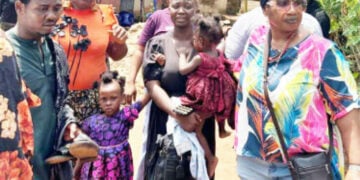The Boko Haram insurgency, which disrupted the northeastern region of Nigeria, particularly Borno State, had devastating consequences on the livelihoods of the local population. Communities that once thrived in agricultural and trade activities now face a harsh reality of displacement and deprivation. Thousands of families lost their homes, businesses, and means of livelihood. Many survivors, now living in camps for internally displaced persons (IDPs), depend heavily on humanitarian aid for survival. While this aid provides temporary relief, it is far from a long-term solution to the crisis. The over-reliance on external assistance creates a cycle of dependence, leaving these communities vulnerable and unable to regain their economic independence.
Before the launch of the livestock settlement initiative by Borno State, in collaboration with the Federal Ministry of Livestock Development, the beneficiaries of the cattle ranches came from over 18 communities in Mafa local government area. These communities had been displaced more than 10 years ago by the Boko Haram insurgency.
The terrorists not only caused death and injury during their attacks but also looted the livestock and food supplies of the pastoralist communities, further deepening the hardship faced by the displaced people.
Recalling the harrowing experiences of the terrorists’ attacks during the state government’s launch of the livestock settlement at Ngarannam in Mafa last weekend, Mohammed Abubakar, one of the beneficiaries, shared his story.
Abubakar, who received a bull, a heifer, a male goat, a female goat, a house, and relief materials, revealed that the 16 communities benefiting from the livestock settlement lost over 2,000 cows, sheep, goats, and other livestock to the insurgents when they attacked their areas. “The terrorists forced us out of our communities, leaving us homeless. I lost about 60 cows, along with our food supplies. They also killed my father and looted everything we had. We have been living in the camp for the past 10 years. Now that the government has provided us with a house and support, we are determined to make the most of this opportunity to improve our lives,” he said.
Umar Dala, a father of 13 children and two wives, also expressed the difficulties his family has faced since their displacement. He explained that the situation has been particularly challenging, as they have struggled to cope with the hardships of living in the camp since they were forced to flee their community.
He described life in the camp as a horrible experience, particularly due to the lack of privacy, which was especially difficult for him as a family man. He recalled the tragic story of one man, whose wife lost her pregnancy while fleeing the terrorist attack in their community. Despite the suffering, he expressed that the support they have received has rekindled their hope for survival.
Toma Mohammed, who lost two sisters along with their livestock, which were taken by the terrorists after their displacement and the destruction of their livelihood, also shared her struggles. Life has been incredibly tough for her and her family. However, she commended the government for providing them with another opportunity after enduring years of hardship. “With the support we have received today, our lives will improve. We are determined to use the livestock to turn our fortunes around. We are deeply grateful to both the Borno State government and the federal government for empowering us,” she said.
When the Borno State government, in collaboration with the Federal Ministry of Livestock Development (FMLD), devised strategies to tackle food security, create jobs, and address the ongoing farmer-herder conflicts in the state, the local population, particularly the beneficiaries of the livestock settlement, were filled with high hopes for improved economic prospects.
These initiatives were seen as a beacon of hope for those struggling in the aftermath of the insurgency.
During the inauguration of the Ngarannam ranch last weekend, Governor Babagana Zulum, invited the Minister of Livestock Development, Idi Mukhtar Maiha, and Professor Attahiru Jega, the co-chair of the Presidential Livestock Reforms Committee (PLRC) and former Chairman of the Independent National Electoral Commission (INEC), to officially unveil the ranch, which will benefit pastoralists from 18 affected communities.
Commissioned on Saturday, January 11, 2025, the Ngarannam Ranch is designed to revitalise the local economy and empower communities that have been devastated by years of Boko Haram conflict.
A total of 461 households from 18 communities have each received pairs of bulls, heifers, goats, and a humanitarian relief package containing essential food and non-food items as part of the Ngarannam Ranch initiative. Beyond the economic and humanitarian support, the ranch also provides educational programmes aimed at securing the future of young nomads. These programmes focus on teaching sustainable farming practices and bringing together various nomadic groups, thereby promoting social cohesion and collaboration for a common goal.
Governor Babagana Zulum revealed that the ranch spans four square kilometers and is enclosed by a perimeter fence to safeguard herders and their livestock from threats like insurgency and cattle rustling, which have particularly plagued northern Borno. Additionally, to address security concerns, 461 houses have been built to accommodate herders who were displaced during the 15-year insurgency. This initiative , according to him, aims to provide both immediate relief and long-term solutions for the affected communities.
“In addition to the houses, each of the 461 families received pairs of bulls and heifers, goats, and a humanitarian relief package. The relief items included essential food and non-food items, recognising that many herders and their families do not rely on beef as part of their diet while rearing livestock.
Governor Zulum highlighted additional ranch facilities, such as a housing estate with road networks, schools, health clinics, veterinary services, and state-of-the-art dairy and beef processing centers. Other completed facilities include pasture and milk collection centers, as well as an earth dam to help prevent conflicts over water and grazing resources. Zulum also explained that the establishment of a market and a security post would encourage trade in beef and dairy products, ensuring food security and improved nutrition for both herders and farmers.
Meanwhile, Professor Attahiru Jega, while expressing his admiration for the livestock settlement, said what he witnessed at Ngarannam was unlike anything he had seen in the country. He described it as the vision of a leader with passion and a strong commitment to driving economic growth. Jega added that livestock development through ranches could significantly improve living conditions by creating jobs across various sectors of the economy.”
Conclusively, LEADERSHIP Weekend writes that efforts to rebuild the region must go beyond the distribution of food and basic supplies. Sustainable development initiatives are needed to empower the affected population and provide them with the skills, resources, and opportunities necessary to rebuild their lives. This includes investments in education, vocational training, and infrastructure, as well as support for local businesses to create jobs and boost economic resilience.
Only through such comprehensive strategies can the region begin to break free from the cycle of dependency, restore its dignity, and ensure lasting peace and prosperity for its people.





